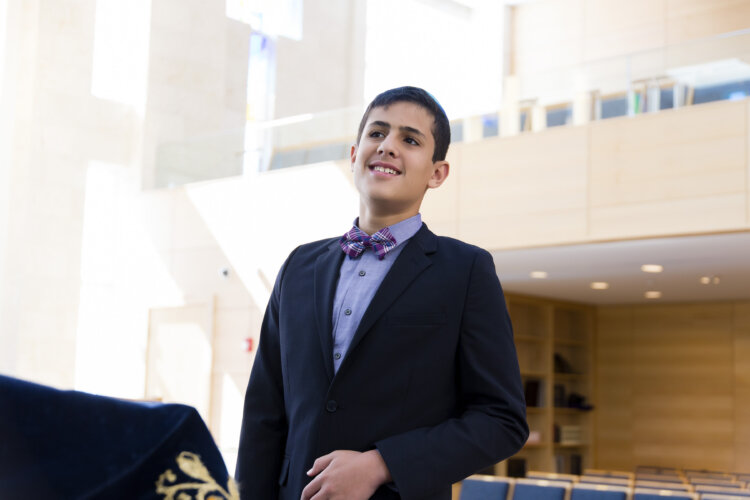
Like most teenagers, my son Benjamin is a walking tangle of hormones who is just beginning to figure himself out. Also, like most teenagers, he is prone to moods that are sudden and intense and mysterious in origin, and when he’s in one he tends to take it out on those closest to him. Often that ends up being me.
Most teenagers say lovely, creative things like “I hate you!” and “You are a terrible parent!” and “I wish you were dead!” to express themselves in these moments. Not Benjamin. Because of his autism, he needs to be taught many of the things that come naturally to his peers, especially anything to do with communication. Expressing himself is one of his biggest challenges.
For a while now, with the help of his therapists, we have been trying to teach him to turn to language when he’s angry or anxious, something that happens when his purple pajama pants are in the laundry or we run out of Chex or we’re about to go on vacation. Like most teenagers, Benjamin wants a lot more control over his life than he often gets to have.
“I’m frustrated!” the adult on duty will exclaim as soon as we see a dark cloud passing over him.
That’s Benjamin’s cue to repeat the line, and often he will. It’s called modeling. The idea is that with enough practice he’ll eventually say it on his own, and that doing so will erase or at least dull his urge to screech or dump a water bottle out onto the floor or, worst of all and unfortunately most common lately, pinch me super hard. The progress has been slow, possibly because “I’m frustrated!” just doesn’t pack the same punch as “I hate you.” Not to mention he has the most difficulty accessing his words when he actually is frustrated.
Sometimes you can see how hard he’s trying to hold it together, and I think we’re both pretty relieved when he succeeds. Other times, though, he goes right into Tasmanian Devil mode. One minute he’s calmly repeating “three Mommy” (translation: Please change the radio to preset number three”) and asking me for gum, and the next thing you know my handsome, funny 14-year-old is trapped inside a spinning, dusty cloud.
This happened recently in the parking lot outside one of those trampoline park places. Often I can tell exactly what’s bothering him, but this time was murkier. It could have been I hadn’t changed the station quickly enough, or that I’d given him only one piece of gum instead of two. Or maybe it was just the profound heaviness of carrying around every nuanced feeling and thought and opinion he’s ever had—of never, ever being able to share any of it with another human. All I know is that when the minivan door slid open he came out like a tornado, lunging and pinching and just generally freaking out. The physical embodiment of an “I hate you,” I guess.
A kid maybe a couple of years older than Benjamin was there when it all went down. Unlike most teenagers you read about these days, this one was not walking while simultaneously Snapchatting or vaping or playing Fortnite. He was the opposite of distracted, and as soon as he saw what must have looked like an actual physical fight, he raced over to help.
All I know is that when the minivan door slid open he came out like a tornado, lunging and pinching and just generally freaking out. The physical embodiment of an ‘I hate you,’ I guess.
He was there for the loudest, thrashiest part of it, but by the time I was able to register his presence Benjamin had mostly switched back to his regular self and was getting settled in my car’s third row, saying “sorry” and “feel all better Mommy” over and over again.
“Are you okay?” the boy asked, peering into the backseat. “Do you need anything?”
I assured him I was fine, making a big show of looking around for my missing flip flop in an effort to draw attention away from the fact that his question, with all of its earnest concern and total lack of judgement, had made me cry.
I actually really would have loved for him to help me find the shoe, but instead he hugged me.
“I get it—my mom is a single mom and she’s gone through a lot of stuff,” he said while sort of awkwardly patting my back.
It was sweet and weird and even a little bit funny, in the the way that things are funny when you find yourself in a situation you never could have imagined—in this case, partially barefoot outside a trampoline park and in the embrace of a strange minor.
After he left I collected myself and went inside to pick up my two other kids. I tried looking for the guy so I could properly thank him—so I could let him know that despite her struggles, his mom has done a pretty good job. I thought I recognized him a couple of times, but when I looked closer I couldn’t tell if it was actually him or another sporty, medium-height teenage guy with short hair. The place was full of kids his age, and just like Benjamin, he blended right in, even though he was actually very different.


Grok Nation Comment Policy
We welcome thoughtful, grokky comments—keep your negativity and spam to yourself. Please read our Comment Policy before commenting.